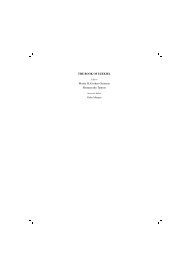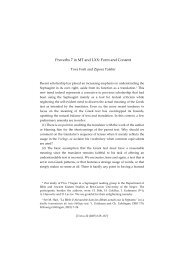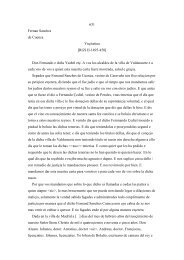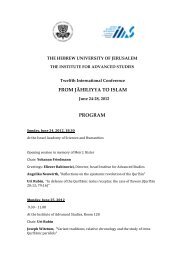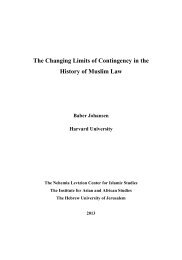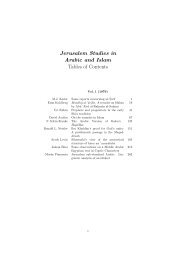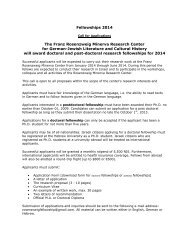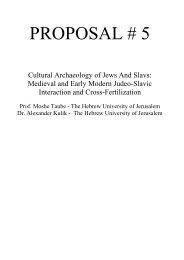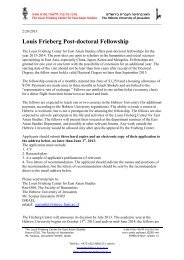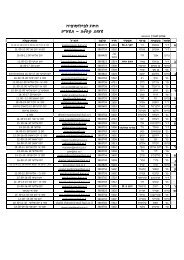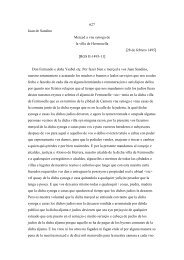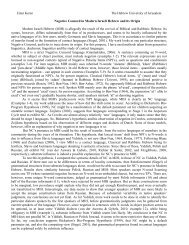Proverbs 7 in MT and LXX: Form and Content
Proverbs 7 in MT and LXX: Form and Content
Proverbs 7 in MT and LXX: Form and Content
You also want an ePaper? Increase the reach of your titles
YUMPU automatically turns print PDFs into web optimized ePapers that Google loves.
<strong>Proverbs</strong> 7 <strong>MT</strong> <strong>and</strong> <strong>LXX</strong> 163<br />
formulated as a parallel to ,called for an animal’s name that he found<br />
<strong>in</strong> his own milieu. 83<br />
The last word of this verse – –was read differently, <strong>and</strong> understood<br />
as part of the follow<strong>in</strong>g verse. 84<br />
Verse 23<br />
361 % 7 #%*.A*(("< "%"<br />
+1 (!1 +#! * " .<br />
! <br />
$# "1 ."% 1<br />
The order of the <strong>MT</strong>, awkward as it may seem, is preserved <strong>in</strong> the <strong>LXX</strong>. The<br />
differences, however, are conspicuous. In the <strong>MT</strong> this verse cont<strong>in</strong>ues the<br />
previous scene: “22 he follows her, like an ox... 23 Until an arrow...”. In the<br />
<strong>LXX</strong>, on the other h<strong>and</strong>, a new simile develops: “or as a hart shot <strong>in</strong> the<br />
liver.” This probably derives from the preced<strong>in</strong>g read as OB, ‘deer,<br />
hart’. While a different read<strong>in</strong>g is <strong>in</strong>volved <strong>in</strong> this case, the change as a<br />
whole seems rather to derive from the translator, s<strong>in</strong>ce the difference<br />
<strong>in</strong>volves more than just the variant. The word assumes a new position <strong>and</strong><br />
the <strong>MT</strong>’s structure (‘Until the arrow pierces his liver’) is replaced by a<br />
participial clause that cont<strong>in</strong>ues the previous series of metaphors.<br />
83 The Vulgate seems to comb<strong>in</strong>e different possibilities: ‘statim eam sequitur quasi<br />
bos ductus ad victimam et quasi agnus ( P P ) lasciviens et ignorans quod ad<br />
v<strong>in</strong>cula stultus ( ) trahatur ( P ),’ ‘he follows her steadily, like an ox go<strong>in</strong>g to the<br />
slaughter, <strong>and</strong> like a lamb, wanton <strong>and</strong> ignorant, <strong>in</strong> that a fool is dragged to fetters’.<br />
84 The Peshitta—heavily dependent on the <strong>LXX</strong> <strong>in</strong> the book of <strong>Proverbs</strong>—copies<br />
the <strong>LXX</strong>: 45 & (% 44<br />
. It hardly has an <strong>in</strong>dependent value for the transmission of the Hebrew text.<br />
Similarly, the Targum of <strong>Proverbs</strong> is not an <strong>in</strong>dependent translation of a Hebrew<br />
text, but rather a version of the Peshitta. In our verse, the Targum copies the<br />
Peshitta; note, however, that while the Peshitta has ‘like an <strong>in</strong>nocent child’,<br />
deriv<strong>in</strong>g from , the Targum has , a Syriac adverbial form that rather<br />
corresponds to . See M.P. Weitzman, The Syriac Version of the Old Testament<br />
(Cambridge, 1999) 68–86, <strong>and</strong> 109–110, where our verse is adduced as a case <strong>in</strong><br />
which the pattern of the Targum can only derive from the Peshitta.



